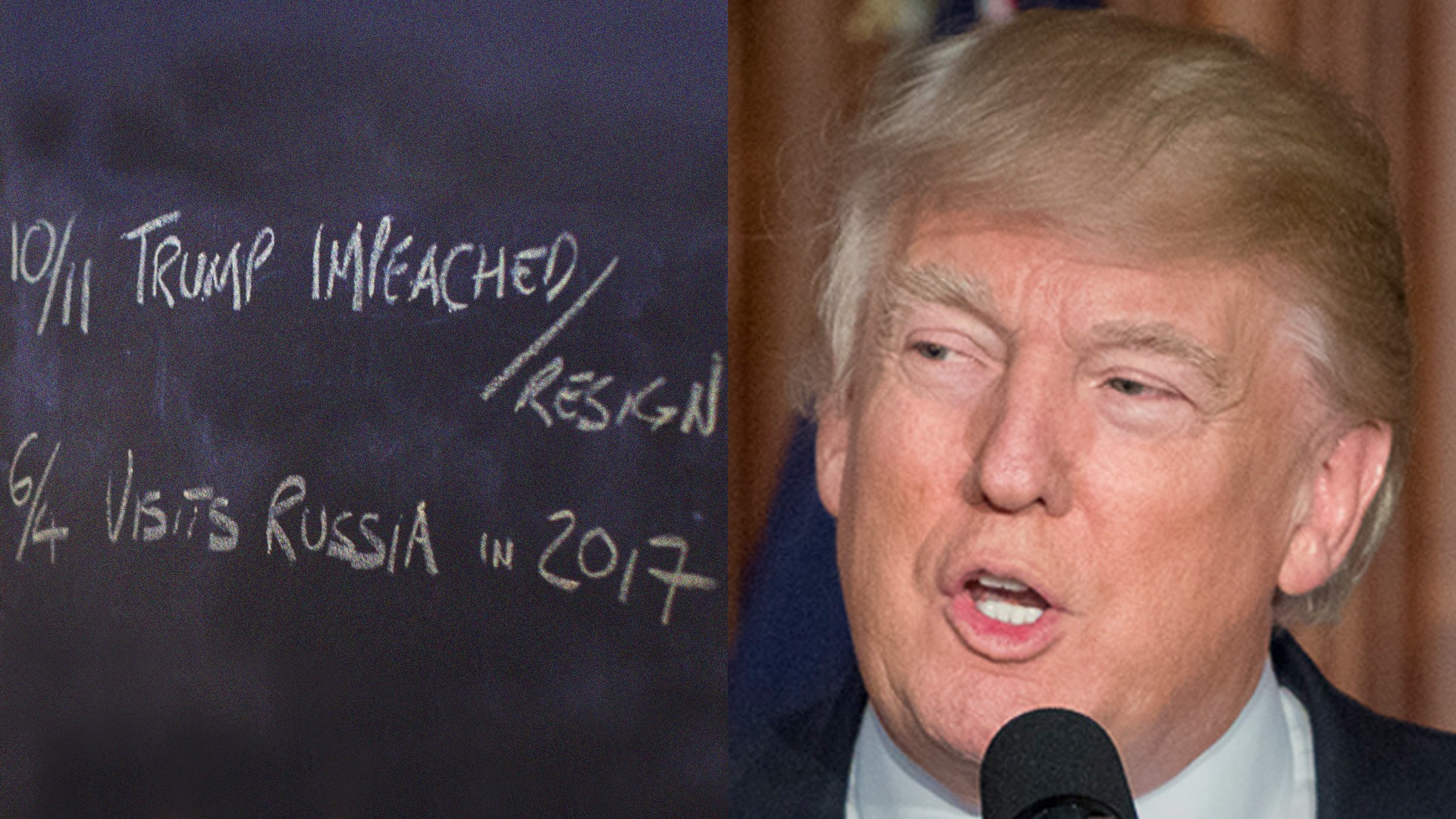Photo of an October anti-Trump rally by Scott Olson/Getty Images
Just a few months into his presidency, Donald Trump has done wonders for the progressive movement. Anti-Trumpism has generated an unprecedented nationwide outpouring of anger, resistance, and mobilization. Protests and marches have attracted crowds in the hundreds of thousands. Calls have flooded congressional offices. Grassroots organizations are multiplying, and more Democratic women are running for office than ever before. Most of these actions are responses to specific issues—the Women's March and the March for Science come to mind—but it's not hard to view fear and contempt of Trump as the motivating factor underlying everything.And that could be a problem for Democrats.Even as the party's base and legislators begin to unify around the idea that this erratic president should be impeached and removed as soon as possible, progressives ought to start thinking about what a post-Trump landscape might look like—and what principals unite them beyond the urge to drive their foe out of the White House.Any Republican president would encounter resistance, but Trump offends progressives' sensibilities in a way other Republicans don't. Many consider him vulgar, narcissistic, and self-serving, a pathological liar who seems unprepared for, even incurious about, the office he's holding. He brazenly flouts ethics laws. The rationale to see him ousted is understandable on some level: Everyone, from Bernie Sanders supporters to more moderate Democrats to a faction of breakaway conservatives to a good chunk of the media, would love to see Trump fail.The good news for them is Trump is notoriously erratic, and his administration's lack of discipline and experience is both stalling its agenda and making Trump's removal more likely.But if progressives get their wish and Vice President Mike Pence takes over, those distractions aren't likely to endure. Policy differences between moderate and conservative Republicans might persist under a Pence presidency, but without the daily breaking news of scandal to distract them, the right would have more space to iron out their differences with a president who understands how Congress works.
Watch: British people are betting on impeachment
I reached out to three large progressive organizations in the country to get their read on whether their leaders thought progressive activism has become too closely aligned with anti-Trumpism, and whether they are thinking about a world after Trump.Charles Chamberlain is the executive director of Democracy for America, a group that has called for impeachment. "Calling on the House to start impeachment hearings and remove Trump from office isn't a partisan political strategy, it's a moral imperative to protect the foundations of democracy and prove that even the president isn't above the law," he told me.He added that removal, when it comes, would be an unambiguous defeat not just for Trump but the whole GOP: "When Trump resigns or is impeached, whatever Republican administration replaces him will be a badly wounded lame duck president unable to accomplish anything against a relentless resistance that won't give up until the Republicans who supported his extreme policies are swept out of office."Ben Wikler, the Washington director of MoveOn.org—another pro-impeachment liberal group—echoed Chamberlain's optimism: "If you look at polling, the number of Republicans who strongly support Trump is small and shrinking, and so right now, I don't anticipate that Trump will engender greater enthusiasm on the Republican side, so you wind up with a progressive movement that continues to surge with fighting spirit and a deflated conservative movement, which is a recipe for a landslide on our side."The question for progressives isn't whether to push for impeachment—it's about what happens after that.Will Democrats be ready to lead the country with a clear vision for the future, or will we again see the kind of intraparty squabbling between the Bernie Sanders and Clinton wings that so dominated the primaries, the same kind of divide between centrists and hard-liners that is currently plaguing the Republicans?For now, however, Democrats are stuck in reactive mode, with little option but to push back. Until the midterms—18 months away, which might as well be an eternity—the party isn't going to be able to do much of anything beyond protest, fundraise, and dream."The hard truth is that right now, at the federal level, progressives don't have the House, Senate, or presidency," Levin told me. "What we have is the power to respond, and quite frankly, what we're responding to is an awful, regressive, often racist or misogynistic agenda that this administration and Congress is pushing. We hope that in the not too distant future we'll be able to set the agenda again, but that's not where advocates on the ground are right now. It's just not where our power lies."Eric Sasson is the author of Margins of Tolerance and the forthcoming novel Admissions. He is a regular contributor to The New Republic and GOOD magazine. Follow him on Twitter and visit his website.
Advertisement
Advertisement
Watch: British people are betting on impeachment

I reached out to three large progressive organizations in the country to get their read on whether their leaders thought progressive activism has become too closely aligned with anti-Trumpism, and whether they are thinking about a world after Trump.Charles Chamberlain is the executive director of Democracy for America, a group that has called for impeachment. "Calling on the House to start impeachment hearings and remove Trump from office isn't a partisan political strategy, it's a moral imperative to protect the foundations of democracy and prove that even the president isn't above the law," he told me.He added that removal, when it comes, would be an unambiguous defeat not just for Trump but the whole GOP: "When Trump resigns or is impeached, whatever Republican administration replaces him will be a badly wounded lame duck president unable to accomplish anything against a relentless resistance that won't give up until the Republicans who supported his extreme policies are swept out of office."Ben Wikler, the Washington director of MoveOn.org—another pro-impeachment liberal group—echoed Chamberlain's optimism: "If you look at polling, the number of Republicans who strongly support Trump is small and shrinking, and so right now, I don't anticipate that Trump will engender greater enthusiasm on the Republican side, so you wind up with a progressive movement that continues to surge with fighting spirit and a deflated conservative movement, which is a recipe for a landslide on our side."
Advertisement
Both Wikler and Chamberlain also pointed out that the battle over the Republicans' American Health Care Act was about policy, not just Trump. That view was echoed by Ezra Levin, co-executive Director of Indivisible. "The reaction to Trumpcare was a reaction to the House bill," he said. "In the event that we would have some other president who was pushing these policies, I think we would see similar pushback."Still, Levin conceded that progressives need to come up with a game plan. "I do think there is a need for a bold progressive vision for the future. We need to have an alternative aside from 'we don't like Trump' or 'vote for us, we're not in league with Russia.' You know, that's not enough… I think it's going to be pretty clear when folks are running this year in the special elections and next year in the midterms."Complicating any efforts to assemble a vision is the multifaceted scandal over Russia's efforts to influence the 2016 election, Trump's firing of FBI director James Comey, and any wrongdoing by current or former White House officials. Seemingly every day brings fresh news about these issues, and they rightly alarm many progressives.But alarming headlines in the Washington Post and the New York Times haven't done anything to change the minds of Trump's voters. His approval rating remains stubbornly high among Republicans, a fact that likely confounds liberals far more than conservatives. And by 46–38 percent, more voters in a recent Politico poll are against starting impeachment hearings than for them."We need to have an alternative aside from 'we don't like trump' or 'vote for us, we're not in league with Russia.'"
Advertisement
The Russia affair also means the media is spending little time focusing on other issues that may be of great concern to progressives. Case in point: Just this past week, Trump essentially killed Dodd-Frank, effectively gutting Barack Obama's signature attempt at Wall Street reform. In another week, under a different president, this would have been much bigger news.One danger of focusing so much ire on a single personality—even one as deserving of contempt as Trump—is that once that person is defeated, or even neutered, the anger may dissipate, or become much harder to harness. Progressive organizations might find that without Trump to kick around, some of their less committed members might think the battle has been won, when in fact it may just be beginning.Another problem of anti-Trumpism is that there's no proof it wins elections. Just ask Hillary Clinton, whose campaign is remembered far more for its unrelenting anti-Trump message than it is for a governing vision based on policy. A surprising statistic about Trump's election is that voters may have been less duped by his cult of personality than many liberals would like to think. A great deal of Trump supporters were turned off by him personally and voted for him anyway. Even if Trump's actions eventually sink his presidency, that won't necessarily bring progressives back to power.**Related: **This Short, Terrifying Book Explains How the West Could Collapse
Advertisement
